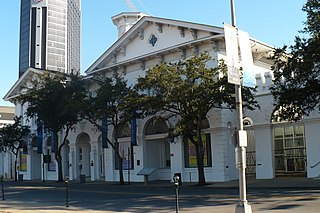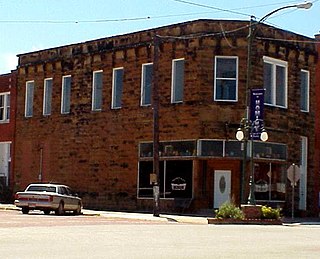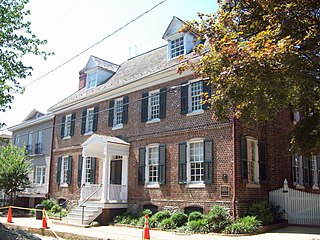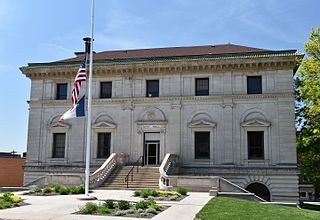
Terrace Hill, also known as Hubbell Mansion, Benjamin F. Allen House or the Iowa Governor's Mansion, is the official residence of the governor of Iowa, United States. Located at 2300 Grand Avenue in Des Moines, it is an example of Second Empire architecture. The home measures 18,000 square feet. It sits on a hill overlooking downtown Des Moines, and has a 90-foot (27 m) tower that offers a commanding view of the city. The building's steeply pitched mansard roof, open verandas, long and narrow and frequently paired windows, and bracketed eaves give this house an irreplaceable design. The house was designated a National Historic Landmark in 2003.

Marycrest College Historic District is located on a bluff overlooking the West End of Davenport, Iowa, United States. The district encompasses the campus of Marycrest College, which was a small, private collegiate institution. The school became Teikyo Marycrest University and finally Marycrest International University after affiliating with a private educational consortium during the 1990s. The school closed in 2002 because of financial shortcomings. The campus has been listed on the Davenport Register of Historic Properties and on the National Register of Historic Places since 2004. At the time of its nomination, the historic district consisted of 13 resources, including six contributing buildings and five non-contributing buildings. Two of the buildings were already individually listed on the National Register.

Buffalo City Hall is the seat for municipal government in the City of Buffalo, New York. Located at 65 Niagara Square, the 32-story Art Deco building was completed in 1931 by Dietel, Wade & Jones.

The Missouri State Capitol is the home of the Missouri General Assembly and the executive branch of government of the U.S. state of Missouri. Located in Jefferson City at 201 West Capitol Avenue, it is the third capitol to be built in the city. The domed building, designed by the New York City architectural firm of Tracy and Swartwout, was completed in 1917.

The Council Grove Historic District is a National Historic Landmark District located in Council Grove, Kansas, United States. It consists of six discontiguous areas in the city important in the history of the Santa Fe Trail and American migration to the west in the 19th century. Council Grove was named for the occasion of an 1825 treaty negotiation between the Osage Indians and the US Federal government which guaranteed the Santa Fe caravans safe passage through Osage territory. The landmark was designated in 1963.

The Bank of Bigheart was a bank based in Barnsdall, Oklahoma and is also the name of its surviving historic commercial building, at 308 W. Main St. in Barnsdall.

The Noble–Seymour–Crippen House is a mansion located at 5624 North Newark Avenue in Chicago's Norwood Park community area. Its southern wing, built in 1833, is widely considered the oldest existing building in Chicago.

Old City Hall, also known as the Southern Market, is a historic complex of adjoining buildings in Mobile, Alabama, that currently houses the History Museum of Mobile. The complex was built from 1855 to 1857 to serve as a city hall and as a marketplace. It was declared a National Historic Landmark in 1973, as a rare well-preserved example of a 19th-century multifunction civic and commercial building.

The Bank of Hominy, at W. Main St. and S. Price Ave. in Hominy, Oklahoma, is a building constructed in 1906, two years after the Oklahoma oil boom of 1904. It is one of four small bank buildings built in Richardsonian Romanesque style in Osage County, Oklahoma during 1904–1911. The others are Bank of Burbank, Bank of Bigheart, and Osage Bank of Fairfax.

The Peggy Stewart House, also known as the Rutland-Jenifer-Stone House, is a Georgian style house in Annapolis, Maryland. Built between 1761 and 1764 by Thomas Rutland as a rental property, it was owned at various times by Thomas Stone and U.S. Founding Father Daniel of St. Thomas Jenifer. In October 1774 it was owned by Anthony Stewart, owner of the ship Peggy Stewart. It was listed in the National Register of Historic Places in 1973 for its associations with the burning of Anthony Stewart's ship, Peggy Stewart, as well as for its architectural significance as a mid- to late 18th century Georgian mansion. Furthermore, the dwelling was recognized as a National Historic Landmark for its associations with Jenifer and Stone, and for the thematic representation of politics and diplomacy during the American Revolution

The Raphael Semmes House, also known as the Horta–Semmes House, is a historic residence in Mobile, Alabama. It is best known for having been the home of Admiral Raphael Semmes, captain of the Confederate sloop-of-war CSS Alabama. The house was added to the National Register of Historic Places on February 26, 1970.

The Czecho Slovakian Association Hall, also known as Preucil School of Music, is a building in Iowa City, Iowa that was built in 1900, as a community center and meeting place for the Czechoslovakian Protective Society (C.S.P.S.), which later became the Czecho Slovakian Association. The C.S.P.S., like other fraternal organizations, began by offering a kind of insurance. The local chapter was organized in Iowa City in 1882. It served the Czech community that was concentrated in the north and northeast areas of the city. Like other C.S.P.S. halls, it hosted social, cultural, and educational activities, and this one also hosted gymnastics.

The U.S. Courthouse, Post Office and Customs House, also just known as the Federal Building, is a historic federal government building at Main and 2nd Streets in downtown Newport, Vermont. Completed in 1904, it served historically as a courthouse, as a customhouse, and as a post office, and is the city's tallest building. It was listed on the National Register of Historic Places in 1976.

The Wapello County Courthouse in Ottumwa, Iowa, United States, was built in 1894. It was listed on the National Register of Historic Places in 1981 as a part of the County Courthouses in Iowa Thematic Resource. The courthouse is the fourth building the county has used for court functions and county administration. It is part of the Central Park area, which includes: Ottumwa Public Library, Ottumwa City Hall, and St. Mary of the Visitation Catholic Church.

The Des Moines City Hall is a government building in Des Moines, Iowa, built in 1909 and 1910. It was individually listed on the National Register of Historic Places on November 10, 1977 as the Municipal Building, and became a contributing property in the Civic Center Historic District in 1988. The building serves as the seat for the government of the city of Des Moines. Beginning April 7, 2016, City Hall offices were temporarily relocated while the building underwent renovation. The construction was necessary to install modern heating, cooling, and sprinkler systems while preserving the historic character of the building. The project was expected to take 18–24 months. During that time, City Hall was closed to the public, and City offices moved to other nearby locations. Between February 26, 2018 and April 9, 2018, city offices moved back to City Hall.

The Delaware County Courthouse, located in Manchester, Iowa, United States, was built in 1894. It was listed on the National Register of Historic Places in 1981 as a part of the County Courthouses in Iowa Thematic Resource. The current structure is the fourth building to house court functions and county administration.

The Marquette City Hall is a former government building located at 204 Washington Street in Marquette, Michigan. It was listed on the National Register of Historic Places in 1975 and designated a Michigan State Historic Site in 1974.

Ottumwa City Hall is the official seat of government for the city of Ottumwa, Iowa, United States. The building originally served as a post office and federal courthouse. It is part of the Central Park area, which includes: Ottumwa Public Library, Wapello County Courthouse and St. Mary of the Visitation Catholic Church. The building was listed on the National Register of Historic Places in 1976.

Grand Mound Town Hall and Waterworks Historic District, also known as Hose house, pump house, is a historic district located in Grand Mound, Iowa, United States. It was listed on the National Register of Historic Places in 2001. The district is composed of two buildings and the town's water tower.

Old Indianapolis City Hall, formerly known as the Indiana State Museum, is a historic city hall located at Indianapolis, Indiana. It was built in 1909–1910, and is a four-story, Classical Revival style brick building sheathed in Indiana limestone. It measures 188 by 133 feet.





















